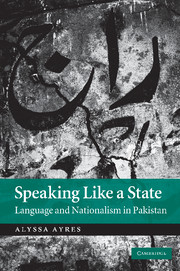Book contents
- Frontmatter
- Contents
- List of illustrations
- List of tables
- Acknowledgments
- Note on transliteration
- Introduction
- 1 Articulating a new nation
- 2 Urdu and the nation
- 3 The nation and its margins
- 4 The case of Punjab, part I: elite efforts
- 5 The case of Punjab, part II: popular culture
- 6 History and local absence
- 7 Bringing back the local past
- 8 Speaking like a state: language planning
- 9 Religion, nation, language
- 10 Conclusion
- Bibliography
- Index
7 - Bringing back the local past
Published online by Cambridge University Press: 25 August 2009
- Frontmatter
- Contents
- List of illustrations
- List of tables
- Acknowledgments
- Note on transliteration
- Introduction
- 1 Articulating a new nation
- 2 Urdu and the nation
- 3 The nation and its margins
- 4 The case of Punjab, part I: elite efforts
- 5 The case of Punjab, part II: popular culture
- 6 History and local absence
- 7 Bringing back the local past
- 8 Speaking like a state: language planning
- 9 Religion, nation, language
- 10 Conclusion
- Bibliography
- Index
Summary
If we have created Pakistan – a land which has deep roots in history – there must be the history of the land and of the people who have lived and laboured here.
Dr. Ahmed Hasan Dani, “Discovery of Pakistan” (1996)Our earth, we are told, was not our own until people from distant lands came and conquered it (and us), for us. Our ancient heroes cannot be our heroes because they preceded our own conversion to our faith.
Aitzaz Ahsan, The Indus Saga and the Making of Pakistan [1996]Beginning in the mid-1980s but coming into a sort of efflorescence by the 1990s, a series of serious books offering new, regional perspectives on Pakistan's past began to appear. Some of these works reclaim wholesale the pre-Islamic history of the region, some take a longue durée approach to their regional-ethnic history – thus necessitating the inclusion of religions, beliefs, and poetry excised from official state narratives – while still others re-examine the Pakistan Movement from the perspectives of Punjab, Sindh, or NWFP. A brief listing of the works considered here illustrates this emerging climate of historical revisionism:
Ahsan, The Indus Saga and the Making of Pakistan (1996).
Amjad, Tārikh-e-Pākistān: Qadīm Daur (“History of Pakistan: The Ancient Era,” 1989).
Awan, Tahrīk-e-āzādī meṉ Panjāb kā Kirdār (“Punjab's Role in the Freedom Movement,” 1993).
Chauhdry, Tahrīk-e-Pākistān Meṉ Panjāb kā Kirdār (“Punjab's Role in the Pakistan Movement,” 1996).
Leghari, Jidd-o-Jahd-e-āzādī meṉ Sindh kā Kirdār (“Sindh's Role in the Independence Struggle,” 1992; this book does not contain pre-British history).
Leghari, Tahrīk-e-āzādī meṉ Sindh kā Kirdār, 2 Vols. (“Sindh's Role in the Freedom Movement,” 1992; this book contains additional historical material on Sindh).
[…]
- Type
- Chapter
- Information
- Speaking Like a StateLanguage and Nationalism in Pakistan, pp. 138 - 149Publisher: Cambridge University PressPrint publication year: 2009



